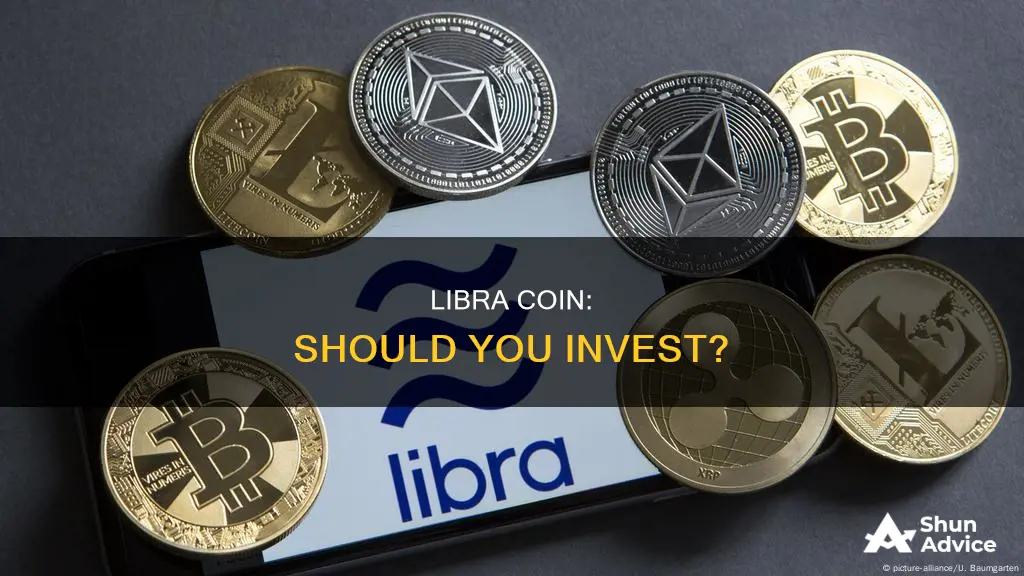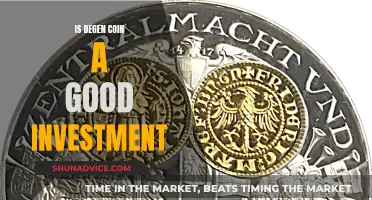
Facebook's Libra coin is a cryptocurrency that was unveiled in 2019. It is designed to streamline the process of transferring money over the company's social media platforms. The Libra coin is not a cryptocurrency that you purchase to trade on the market in the hope of making money – it will be more like exchanging a dollar for a euro. The Libra Association, a consortium of companies and foundations, manages Libra's blockchain. Almost 30 companies have signed up to use the social media giant's virtual currency, and it is expected that Facebook users will be able to swap their real-world money for Libra digital coins. However, Libra has faced regulatory scrutiny and backlash from lawmakers and regulators due to concerns about Facebook's massive size and handling of user privacy.
| Characteristics | Values |
|---|---|
| Launch Date | Expected in the first half of 2020 |
| Regulatory Scrutiny | Unprecedented |
| Regulatory Bodies Involved | Financial Stability Board, G20 countries, U.S. lawmakers and regulators, Bank of England, FINMA, Federal Reserve, consumer protection watchdogs, Financial Crimes and Enforcement Network (FinCEN), New York State’s Department of Financial Services |
| Backing Organisations | Uber, Spotify, Mastercard, eBay, Vodafone |
| Technology Used | Blockchain |
| Accessibility | Available through apps like WhatsApp and Facebook Messenger |
| Target Audience | 1.7 billion people worldwide who don't have access to a bank account |
| Value | Pegged to well-known currencies like the US dollar |
| Purchase and Trade | Not a cryptocurrency that can be purchased to trade on the market |
| Wallet | Calibra |
What You'll Learn

Libra coin's regulatory challenges
Facebook's Libra coin has faced a host of regulatory challenges since its announcement in June 2019.
Firstly, the social media giant's foray into cryptocurrency has raised concerns about data privacy. Facebook has a history of privacy breaches and lawmakers worry that the company is already too massive and careless with user data. The separation of Facebook as a social media company and Libra as a means of payment is a key regulatory aspect that will be scrutinized. Facebook will need to address this credibility gap and comply with regulations such as "know your customer", which require deep knowledge of customers—a serious weakness of Facebook in the past.
Secondly, Libra's potential impact on monetary policy and financial stability has been questioned. Libra is not a currency but a crypto asset, pegged to a basket of fiat currencies. As such, it will be dependent on the ability to convert it into these fiat currencies, a tedious process that will be subject to the characteristics of each currency, their convertibility, and foreign exchange rules and regulations. Central banks are not expected to intervene in a run on non-fiat currencies, so Libra will be allowed to fail. The risks associated with the supply and demand for Libra could reach systemic proportions if it becomes widely circulated.
Thirdly, Libra's potential role in money laundering and other criminal activities has been highlighted. Facebook will need to implement robust compliance frameworks to screen transactions for illicit activity and verify customer identities, which could be costly.
Finally, there are concerns about Libra's impact on the revenue of central banks and governments. A shift from domestic currency to Libra could reduce seigniorage revenue and damage public finances. Libra could also become a vehicle for capital flight and currency attacks if people lose confidence in a country's financial system.
Overall, the Libra project has raised many regulatory questions, and Facebook will need to navigate a complex web of rules and standards to bring it to fruition.
Bitcoin Mining: Worth the Investment?
You may want to see also

Libra's value and volatility
Libra is a stablecoin, which means it is a cryptocurrency that is pegged to a fiat currency or a government-backed security. In Libra's case, it is pegged to a group of low-volatility assets, including bank deposits and government securities in multiple currencies. This gives it more stability and less volatility than other cryptocurrencies such as Bitcoin, which is not pegged to anything.
Facebook intends to develop Libra into a "global coin", pegging it to well-known currencies such as the US dollar and British pound. This is to prevent the "wild swings" of conventional cryptocurrencies. Libra's value will be preserved by changing the composition of assets if necessary to achieve stability. It is backed by bank deposits and low-volatility assets, so it is volatile, but in a similar way to the fiat currency we use.
The Libra name comes from the basic Roman measurement of weight. The abbreviation "lb" for a pound is derived from Libra, and the £ symbol originally comes from an ornate L in Libra.
Libra is designed to streamline the process of transferring money over Facebook's social media platforms. It will be available through Facebook's chat apps, including WhatsApp and Facebook Messenger. Facebook says the virtual currency is aimed at the 1.7 billion people worldwide who do not have access to a bank account.
The Libra project is an independent, not-for-profit organisation. Facebook will be an equal partner with a single vote, alongside other industry giants who have paid a minimum of $10 million to participate as a validator in the chain.
Gold Investment: Best Coin Options for You
You may want to see also

Libra's target audience
Facebook's Libra coin is a cryptocurrency designed to streamline the process of transferring money over the company's social media platforms. It is aimed at the 1.7 billion people worldwide who don't have access to a bank account, such as women in developing nations. Libra is also targeted at those without credit cards.
Facebook plans to develop Libra into a ""global coin", pegging it to "well-known currencies" such as the US dollar and British pound. This is intended to prevent the "wild swings" of conventional cryptocurrencies such as bitcoin and Ethereum.
Libra will be based on blockchain technology, but with some key differences from bitcoin. Unlike bitcoin, Libra's blockchain is managed by the Libra Association, a consortium of companies and foundations, with Facebook as the driving force. The Libra Association intends to add more partners over time to further decentralise the currency and build trust.
Facebook says that Libra will be a "faster, cheaper and more secure" alternative to traditional ways of making payments on the internet. The cryptocurrency will be accessible through apps such as Facebook Messenger and WhatsApp, allowing users to send money to each other.
While Libra has created a positive buzz for digital currencies and could help introduce billions of people to the idea of value transfer via blockchain, there are also concerns about its potential impact on decentralisation and user privacy.
Bitcoin in India: Is Investing in Bitcoin Illegal?
You may want to see also

Libra's blockchain technology
Libra, a cryptocurrency created by Facebook, was designed to be a simple, low-fee stablecoin to be used around the world. The digital currency was renamed Diem in 2020 and wound down in 2022.
Libra was to be underpinned by blockchain technology. However, it wasn't a true blockchain currency as it was not fully decentralised. Only members of the Diem Association were able to access the ledger of transactions. Diem Association was to act as a regulatory body for the cryptocurrency and it was not to be run solely by Facebook. Instead, the association was made up of 28 founding partners, including Mastercard, Visa, eBay, and a number of other companies.
The blockchain technology behind Libra was eventually sold to Silvergate Capital Corporation in January 2022.
Facebook claimed that Libra was a "global currency and financial infrastructure". In other words, it was a digital asset built by Facebook and powered by a new Facebook-created version of blockchain, the encrypted technology used by bitcoin and other cryptocurrencies.
The Libra Blockchain was to be built on open-source code that would allow the developer and research community to monitor it for design and security flaws.
Facebook said that Libra was aimed at the 1.7 billion people worldwide who don't have access to a bank account, such as women in developing nations. The cryptocurrency's goal was to become a mainstream digital currency that could be used by anyone. By charging much cheaper fees than other money-sending services, utilising blockchain technology, and holding the value of the currency stable, the Libra initiative wanted to provide better, cheaper, and more open access to financial services for all.
The Right Time to Invest in Bitcoin?
You may want to see also

Libra's impact on Bitcoin
Facebook's Libra coin is not currently available as an investment opportunity. Facebook's subsidiary Calibra, formed to handle Libra transactions, has applied for the necessary licenses to operate. However, the company is facing unprecedented regulatory scrutiny, and it is unclear if and when these applications will be approved.
Firstly, Bitcoin is decentralised, meaning no single entity controls it. In contrast, Libra will be fully powered and controlled by Facebook and the Libra Association, giving large entities considerable power over what could become a top global asset.
Secondly, Libra will be tied to national currencies and other assets, making its value dependent on the inflation and effects of the underlying currencies and on governmental control. On the other hand, Bitcoin's value is not dependent on any one government or traditional financial system.
Thirdly, Bitcoin is deflationary, with a fixed supply of 21 million coins, while the Libra Association will control the supply of Libra coins.
Finally, Bitcoin's blockchain is permissionless, meaning anyone can start mining with the necessary hardware and knowledge. In contrast, Libra's blockchain will initially be permissioned, requiring miners to seek approval before starting to mine.
Some commentators have speculated that Libra could make cryptocurrencies more popular and widespread, which could benefit Bitcoin. However, it is important to note that the cryptocurrency markets reacted slowly to the announcement of Libra, and it is unclear how much of an impact it will have on Bitcoin's value or adoption in the long run.
The Ultimate Guide to Investing in Bitcoin with Xapo
You may want to see also
Frequently asked questions
Libra is a cryptocurrency developed by Facebook, which is designed to streamline the process of transferring money over the company’s social media platforms.
Libra is not a cryptocurrency you purchase to trade on the market. Instead, it will be more like exchanging a dollar for a Euro. Its value is tied to government-issued currency and it is mainly aimed at those without bank accounts.
Facebook users will be able to swap their real-world money for Libra digital coins, in a similar manner to exchanging money for foreign currency. To keep and exchange Libra, users will require a Wallet, an app that might be integrated into other apps.







